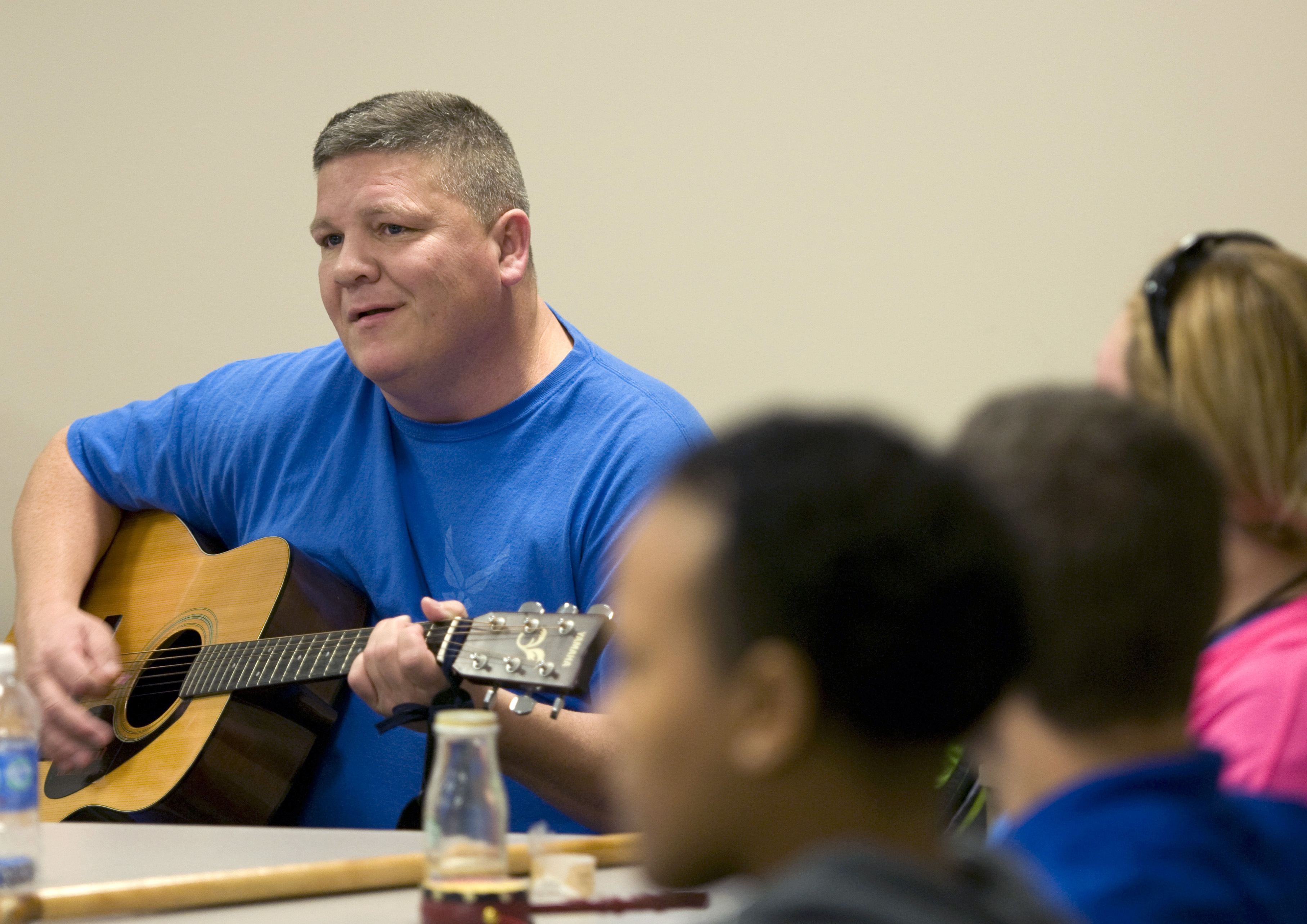By Sean Kimmons, Air Force News Service / Published November
20, 2015
JOINT BASE ANDREWS, Md. (AFNS) -- Former Maj. Frank Vassar
pulled out his cellphone and played a song that he wrote and recorded as other
wounded Airmen listened closely.
“… Bombs going off inside my head. Sometimes wishing I was
dead. Demons deep inside me. I pray so hard I can’t fall asleep. …”
Vassar, 46, explained to about a dozen Airmen at a music
therapy session Nov. 19 on Joint Base Andrews that the song, “Evil,” described
his post-traumatic stress disorder, a condition that he battles using music.
“Music has always been a release for me,” Vassar, of
Oklahoma City, said after the Air Force Wounded Warrior event. “It calms me and
puts me into a different world for a while.”
The world he generally inhabits is haunted with memories
from three combat tours with security forces during his 13-year Air Force
career that ended with him being medically retired.
“Every time I’m dreaming, it always ends in a blast or a
firefight. That’s what I wake up with,” he said.
Some flashbacks stem from a close call with an enemy rocket
while in Iraq in 2004. As he walked toward a courtyard in Baghdad’s Green Zone,
a 122 mm rocket landed about 50 feet from him, causing him to black out and
become disoriented.
“I was trying to figure out what just happened,” he recalled
after the blast. “I looked up and the whole building was moving 15 feet to side
to side. But it wasn’t. It was in my head.”
Finding solace
Years after seeing two friends get killed in Iraq, explosive
ordnance disposal specialist Tech. Sgt. Christopher Ferrell now hopes music can
curb his suicidal thoughts.
“It helps me find peace,” he said about music after his
first introduction to the noninvasive therapy. “I just felt that I could deal
with my demons on my own time.”
Ferrell, who is based at Andrews, said he’s been on five
combat tours in his 12 years with the Air Force. While deployed in late 2009, a
teammate next to him was killed when he triggered a roadside bomb, throwing
Ferrell 15 feet into a wall. Two months later, Ferrell said he saw a second teammate
fatally step on another bomb.
Since then, he’s struggled with the memories and has
contemplated taking his own life.
“After over a decade of war it’s kind of boiled over,” he
said.
With a wife and three children, including a baby, Ferrell
believes they deserve better from him. Music could be a useful approach,
because it lets him focus on the good things in life.
“It taps into so many different parts of the brain,” he
said. “If there is empty space in my head, it fills up with negative things from
my past. So, if I can fill it up with something positive, it helps.”
Music therapy can reduce stress, anxiety and pain, as well
as engage military members in a meaningful activity as opposed to destructive
thoughts or substance abuse.
“It distracts them and gives them something to do that can
become a new habit. It’s kind of like retraining the brain and desensitizing it
in a way,” said Nicki Rubin, a music therapist who helped teach groups of
Airmen attending the weeklong wounded warrior event.
Songs can also make it easier for military members to open
up about past experiences that may be difficult to do in regular therapy
sessions.
“A lot of times traditional talk therapy isn’t efficient or
helpful to veterans who may not be able to verbalize how they’re feeling,”
Rubin said. “So music is a way for them to communicate and express themselves
that seems a little less threatening, and can convey more sometimes than
words.”
And through his music, that’s exactly what Vassar tries to
do.
“It allows me to talk about something that happened without
talking about it,” he said.









No comments:
Post a Comment